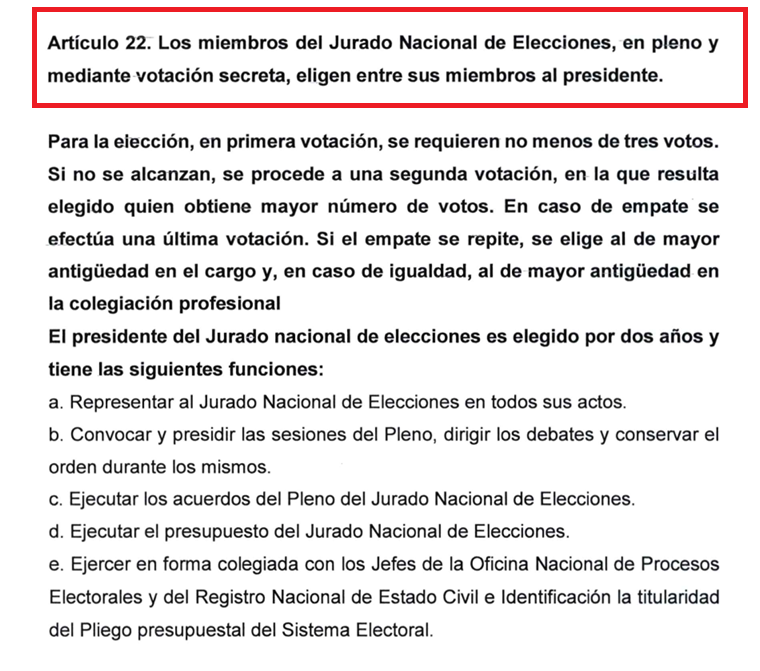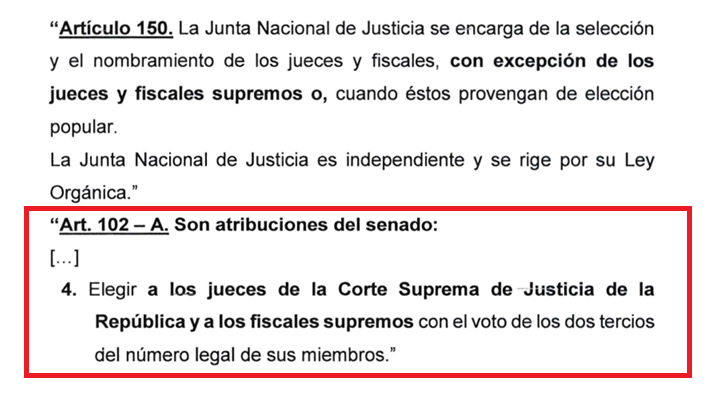The congressman of Free PeruJosé Balcázar, presented a bill No. 9675 that cuts powers to the National Board of Justice (JNJ) so that he Bicameral Congress can elect prosecutors and supreme judgesand changes the method of election of the president of the National Election Jury (JNE).
Counter-reform of justice
The initiative proposes that the National Board of Justice does not elect the prosecutors and supreme judges, and delegates that power to the Senate of the Republic. This second chamber will elect these magistrates with the votes of two-thirds of its total members.
YOU CAN SEE: Escort of the presidential chest revealed that Dina Boluarte ordered to stay alone in the Mikonos condominium
It is planned that After the 2026 general elections there will be a bicameral Congress and the Senate will have 60 members. With the proposal of Congressman José Balcázarthe power to elect prosecutors and supreme judges will be in the hands of at least 40 senators.
Supreme prosecutors are the only ones who can investigate and charge senior officials, such as congressmen accused of alleged crimes. With this change, the Senate will be able to elect the magistrates who are in charge of files against parliamentarians, the President of the Republic, ministers and other high-ranking authorities.
YOU CAN SEE: Congress approves expanding the number of congressmen to more than 237 for the 2031 elections
It also goes against the National Election Jury
The project also, in the same line as Fujimorism, aims to change the method of electing the president of the National Election Jury. Currently, the head of this electoral institution is a magistrate elected by the Supreme Court of the Judiciary.
Balcázar’s proposal is that the president of the JNE is elected by the members of the plenary session of this electoral court and that the duration of his term is two years. This part is similar to what drives Popular Force from the Congressional Constitution Commission with a bill from the Magisterial Bloc legislator, Elizabeth Medina.
The plenary session of the JNE is made up of a representative of the Supreme Court, the Board of Supreme Prosecutors, the Lima Bar Association, the deans of the law faculties of public universities and the deans of the law faculties of Lima. private universities.
Balcázar’s project also seeks to change that.
YOU CAN SEE: Lady Camones confirms that Congress will have a millionaire budget of S/ 1,412 million in 2025

Balcázar’s legislative proposal says that the representatives in the JNE of the Judiciary and the Public Ministry no They will be licensed prosecutors and supreme judges, but only those who are retired or laid off.
Likewise, the representative of the jurists will not only be from the Lima Bar Association, but from all members nationwide. And regarding the judges who come from the law faculties of public and private universities, the election will not only be carried out by the deans, but also by the “senior professors.”
Balcázar’s initiative bears the signatures of his colleagues from Perú Libre, Flavio Cruz, Américo Gonza, Isaac Mita, Kelly Portalatino and María Taipe.
The text also seeks other changes in the justice system such as the election of the president of the Supreme Court.
YOU CAN SEE: Fujimori Martha Moyano insists on reform of the inter-American human rights system
Commissions in the power of Fujicerronism to give the blow
Due to the reforms to the Constitution and organic laws that it proposes, the initiative must be discussed in the Constitution Commission, chaired by Fujimori Fernando Rospigliosiand in the Justice Commission, led by Cerronista Isaac Mita.
As is known, Congress is against the clock because the deadline for them to modify the electoral rules to apply in the 2026 election process expires in March 2025. This implies changing the modality of election of the president of the JNE. There is an approved opinion that is waiting to be debated in plenary this week, before the end of the legislature.
The Peru Libre project thus adds to the aspirations of Fujimorism and its allies. Coincidences again.















